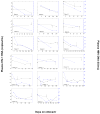The anti-HIV activity of entecavir: a multicentre evaluation of lamivudine-experienced and lamivudine-naive patients
- PMID: 18453854
- PMCID: PMC2722443
- DOI: 10.1097/QAD.0b013e3282ffde91
The anti-HIV activity of entecavir: a multicentre evaluation of lamivudine-experienced and lamivudine-naive patients
Abstract
Background: Entecavir, an antiviral with potent anti-hepatitis B virus activity, was recently shown to have anti-HIV activity in three patients and the ability to select for the lamivudine-resistant HIV polymerase mutation M184V in a patient with prior antiretroviral therapy.
Objectives: To further characterize entecavir's anti-HIV activity and identify risk factors for selection of the M184V.
Design: Retrospective cohort study.
Methods: We evaluated the virological characteristics of HIV and hepatitis B virus in 17 HIV-hepatitis B virus coinfected patients (10 antiretroviral therapy-naive and seven antiretroviral therapy-experienced) prior to and during entecavir monotherapy. Descriptive statistics were used to assess changes in HIV RNA and hepatitis B virus DNA. Variables associated with development of the M184V were determined by univariate analysis.
Results: Of the 17 patients, 13 (76%) demonstrated a reduction in HIV RNA by at least 0.5 log10 copies/ml. Of the remaining four patients, two had the M184V detected prior to entecavir therapy and the other two had wild-type HIV. The median reduction in HIV RNA for the cohort was 1.2 log10 copies/ml, which was similar in antiretroviral therapy-naive and antiretroviral therapy-experienced patients. The M184V mutation emerged in six patients receiving entecavir, including three antiretroviral therapy-naive patients. No other HIV mutations were consistently detected. Risk factors for the emergence of the M184V mutation were a decline in hepatitis B virus DNA (P = 0.04) and duration of entecavir use (P = 0.05).
Conclusion: Entecavir monotherapy in HIV-hepatitis B virus coinfected patients, including antiretroviral therapy-naive patients, has significant anti-HIV activity and can result in the development of the M184V variant. Entecavir should not be used in such co-infected patients without concomitant antiretroviral therapy.
Figures

Comment in
-
How should chronic hepatitis B virus infection be managed in HIV-hepatitis B virus-coinfected patients not eligible for concomitant antiretroviral therapy?AIDS. 2008 Nov 30;22(18):2551-2. doi: 10.1097/QAD.0b013e328318f15b. AIDS. 2008. PMID: 19005283 No abstract available.
Similar articles
-
The HBV drug entecavir - effects on HIV-1 replication and resistance.N Engl J Med. 2007 Jun 21;356(25):2614-21. doi: 10.1056/NEJMoa067710. N Engl J Med. 2007. PMID: 17582071 Free PMC article.
-
Efficacy and safety of entecavir for chronic HBV in HIV/HBV coinfected patients receiving lamivudine as part of antiretroviral therapy.AIDS. 2008 Sep 12;22(14):1779-87. doi: 10.1097/QAD.0b013e32830b3ab5. AIDS. 2008. PMID: 18753861 Clinical Trial.
-
Antiviral effect of entecavir in chronic hepatitis B: influence of prior exposure to nucleos(t)ide analogues.J Hepatol. 2010 Apr;52(4):493-500. doi: 10.1016/j.jhep.2010.01.012. Epub 2010 Feb 4. J Hepatol. 2010. PMID: 20185191 Clinical Trial.
-
[Treating chronic lamivudine-resistant hepatitis B in HIV co-infected patients].Gastroenterol Clin Biol. 2006 Oct;30(10 Pt 2):3S22-5. Gastroenterol Clin Biol. 2006. PMID: 17075492 Review. French. No abstract available.
-
Entecavir: a new nucleoside analog for the treatment of chronic hepatitis B infection.Pharmacotherapy. 2006 Dec;26(12):1745-57. doi: 10.1592/phco.26.12.1745. Pharmacotherapy. 2006. PMID: 17125436 Review.
Cited by
-
Management of chronic hepatitis B in patients from special populations.Cold Spring Harb Perspect Med. 2015 Jun 1;5(6):a021527. doi: 10.1101/cshperspect.a021527. Cold Spring Harb Perspect Med. 2015. PMID: 26033083 Free PMC article. Review.
-
Human Immunodeficiency Virus-1 Drug Resistance Mutations in Iranian Treatment-experienced Individuals.Curr HIV Res. 2024;22(1):53-64. doi: 10.2174/011570162X273321240105081444. Curr HIV Res. 2024. PMID: 38310469
-
Hepatitis B in HIV: available treatment options and approach to therapy.Curr Infect Dis Rep. 2009 Sep;11(5):407-13. doi: 10.1007/s11908-009-0057-8. Curr Infect Dis Rep. 2009. PMID: 19698285
-
Italian consensus statement on management of HIV-infected individuals with advanced disease naïve to antiretroviral therapy.Infection. 2009 Jun;37(3):270-82. doi: 10.1007/s15010-008-8134-8. Epub 2009 May 28. Infection. 2009. PMID: 19479193
-
HBV and HIV co-infection: Impact on liver pathobiology and therapeutic approaches.World J Hepatol. 2015 Jan 27;7(1):121-6. doi: 10.4254/wjh.v7.i1.121. World J Hepatol. 2015. PMID: 25625003 Free PMC article. Review.
References
-
- Soriano V, Puoti M, Bonacini M, Brook G, Cargnel A, Rockstroh J, et al. Care of patients with chronic hepatitis B and HIV coi-infection: recommendations from an HIV-HBV international panel. AIDS. 2005;19:221–240. - PubMed
-
- UNAIDS. Report on the Global AIDS Epidemic:2006. Geneva: UNAIDS; 2006.
-
- Kellerman S, Hanson D, McNaghte A, Fleming P. Prevalence of chronic hepatitis B and incidence of acute hepatitis B infection in human immunodeficiency virus-infected subjects. J Infect Dis. 2003;188:571–577. - PubMed
-
- Konopnicki D, Mocroft A, de Wit S, Antunes F, Ledergerber B, Katlama C, et al. Hepatitis B and HIV: prevalence, AIDS progression, response to highly active antiretroviral therapy and increased mortality in the EuroSIDA cohort. AIDS. 2005;19:593–601. - PubMed
-
- Ockenga J, Tillmann H, Trautwein C, Stoll M, Manns M, Schmidt R. Hepatitis B and C in HIV-infected patients. Prevalence and prognostic value. J Hepatol. 1997;27:18–24. - PubMed
Publication types
MeSH terms
Substances
Grants and funding
LinkOut - more resources
Full Text Sources
Medical

